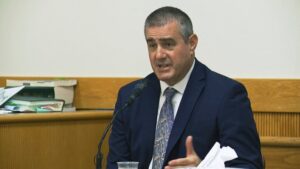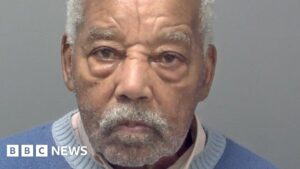
PROVIDENCE, R.I. (AP) — A Rhode Island jury has acquitted former high school basketball coach Aaron Thomas of serious charges, including second-degree child molestation and second-degree sexual assault. However, the jury found him guilty of misdemeanor battery, a lesser charge, in a verdict delivered on Monday.
The decision concluded a nearly six-week trial that scrutinized the controversial practices of Thomas, who had spent decades conducting what he called “naked fat tests” on hundreds of male student-athletes at North Kingstown High School. The jury’s verdict reflects a compromise after attorneys agreed to allow consideration of the misdemeanor charge instead of the more severe allegations initially brought against Thomas.
Defense and Prosecution Arguments
Throughout the trial, Thomas’s defense team argued that his actions, while inappropriate, did not constitute a crime. They emphasized that the tests—where students were asked to remove their clothing for body fat checks—were not conducted for sexual gratification, a crucial element for the charges of molestation and assault.
“We’d like to thank the jury for their attention, their hard work, and for their verdict. We are very satisfied that the jury saw the case as we saw it, no sexual intent whatsoever,” defense attorney John MacDonald stated outside the court.
Conversely, prosecutors contended that Thomas had orchestrated a program that provided him with unfettered access to young, naked boys for years. Attorney General Peter Neronha emphasized the impact on the victims, stating, “Above all else, this case is about the victims who suffered greatly behind closed doors.”
“Pseudo-science is not an excuse for abuse, nor is winning more important than well-being. We believe that what took place here was not just bad judgment, it was, and always has been, criminal conduct.” — Attorney General Peter Neronha
Legal and Sentencing Implications
The conviction of misdemeanor battery carries a maximum penalty of one year in prison and a possible fine of up to $1,000. Sentencing for Thomas is scheduled for June 26. The charges specifically related to incidents involving two former students, one of whom was under 14 at the time, occurring in September 2000 and February 2002.
Prosecutors faced limitations due to Rhode Island’s statute of limitations on second-degree assault, which is currently three years. Neronha has advocated for extending this period to 10 years, which would have enabled the pursuit of additional charges.
Trial Testimonies and Expert Opinions
During the trial, Thomas admitted to conducting tests on over 600 students, with approximately 80% removing their underwear. The tests involved pinching various body areas, including near the groin and buttocks, and were conducted in private settings such as a small room or Thomas’s office.
Body fat composition experts testified that removing underwear was unnecessary, and pinching near the groin lacked scientific validity for determining body fat. More than a dozen former students, law enforcement officers, and school officials provided testimony throughout the proceedings.
Thomas’s legal team challenged the reliability of testimonies from the two former students involved in the charges, highlighting one student’s mental health issues and suggesting financial motivations linked to a separate civil lawsuit.
Community and Educational Impact
The case has sparked significant discussion within the community and educational circles about the oversight of extracurricular programs and the protection of student-athletes. The revelations have prompted calls for stricter guidelines and monitoring of school activities to prevent similar incidents.
As the community awaits the sentencing, the case underscores the importance of safeguarding students’ well-being and ensuring accountability in educational environments. The outcome may influence future legislative efforts to extend statutes of limitations and tighten regulations around school sports programs.
Looking forward, the trial’s conclusion may serve as a catalyst for broader discussions on the balance between athletic success and student safety, reinforcing the need for vigilance in all aspects of student interaction.






